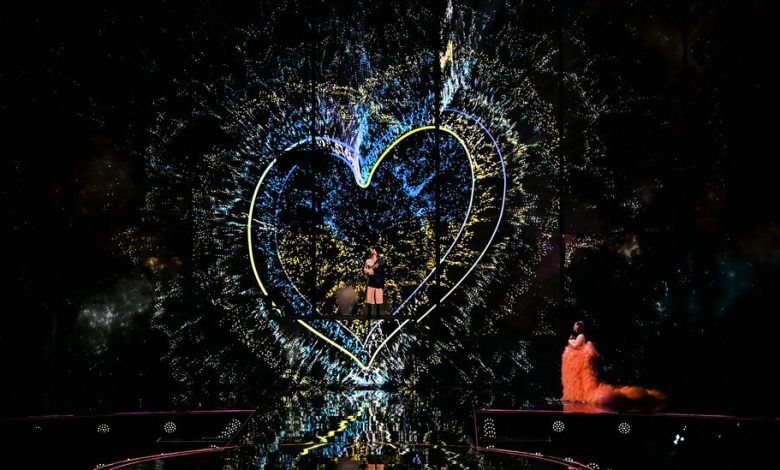How Liverpool Put on a Song Contest for Ukraine

When Ukraine won last year’s Eurovision Song Contest, it gained the right to hold this year’s event. And despite Russia’s invasion, it insisted it would do it.
Ukraine’s public broadcaster issued plans to host the spectacle in the west of the country, out of reach of Russian missiles, while politicians, including President Volodymyr Zelensky, said the nation would make it work.
Even some foreign leaders backed its cause. Last summer, Boris Johnson, Britain’s prime minister at the time, told reporters that Ukraine won Eurovision “fair and square,” so it should host, regardless of the war.
“It’s a year away,” Johnson said. “It’s going to be fine.”
But Ukraine’s dream of staging this year’s Eurovision has failed to materialize. On Saturday night, the final of the glitzy contest — which is expected to draw a television audience of around 160 million — will take place 1,600 miles from Kyiv, in Liverpool, England.
Last summer, after months of discussions, the European Broadcasting Union, which oversees the contest, agreed with Ukrainian authorities to the change of location. With Britain finishing second in last year’s contest, it was an obvious choice. Its public broadcaster, the BBC, agreed to organize the event.
This is Britain’s ninth time hosting the contest since it began in 1956, but the BBC team knew this year would be different. Broadcasters that host Eurovision normally use the contest to advertise their country and its culture to a global television audience. This time, Britain would need to take a back seat.
Martin Osterdahl, the executive supervisor for Eurovision at the European Broadcasting Union, said in an interview that this year’s event would be “Ukraine’s party.” Britain just happened to be hosting it, he added, echoing a sentiment made by a British pop act.
Shortly after the switch was announced, the BBC introduced a contest to select a city to stage the finals, eventually picking Liverpool over six other contenders. In October, the BBC hired Martin Green, an event producer who oversaw the opening and closing ceremonies of the 2012 London Olympics, to oversee the event.
In a recent video interview, Green, 51, said he flew immediately to Warsaw and met with Ukrainian broadcasting officials.
Those officials said they wanted a Eurovision that was a huge “celebration of great Ukrainian culture — past, present and future,” Green recalled. They also wanted the reality of Russia’s invasion shown onscreen — something with the potential to strike a downbeat tone for the traditionally campy, showy spectacle. But they insisted the contest should still be fun, Green said.
“It was really important to have that blessing — that permission — about the nature and style of the show,” Green said.
Back in Britain, Green had just eight months to arrange the contest. He assembled a team — including outside agencies — to work on the event. (Over 1,000 people have contributed, he said.) Every week, his staff had video calls with Ukrainian colleagues to discuss and agree on aspects of the competition. Those included this edition’s slogan, “United by Music”; its stage design; and the special performances that take place onstage during breaks from the competition.
Sometimes, Green said, the Ukrainian side had to delay scheduled calls at the last minute “because an air raid siren had gone off,” or cancel meetings entirely because of power cuts.
“Those were incredibly sobering moments,” Green said. “Ukrainians have such a sheer force of will to carry on, that sometimes you could easily forget.”
German Nenov, a creative director with Ukraine’s public broadcaster, was a vital sounding board for the British team, Green said. In a recent interview, Nenov said it was sometimes “surreal” to be discussing sparkly outfits and dance performances as Russian bombs fell on Ukraine. “These past six months have probably been the most emotional of my life,” he said. “But thanks to Eurovision, I was able to stay strong. It gave me the ability to go on.”
Nenov, 33, is overseeing several special performances by Ukrainian musicians that will play during competition breaks. With those, he said, he wanted to change viewers’ perceptions of his country. When Ukraine hosted Eurovision in 2005 and 2017, he added, those broadcasts featured clichés of traditional life, including embroidered outfits and dancing girls with flowers in their hair. “That’s not Ukraine,” Nenov said; this time, he would show a more modern vision of the country.
Both Nenov and Green declined to give details of Saturday’s grand final, insisting it should come as a surprise for television viewers, but both said the show included Ukrainian and British pop stars. The war would be mentioned, Green said, but in an elegant fashion that was appropriate for “a great big singing competition.”
Osterdahl, the European Broadcasting Union official, said that this year’s collaboration between two countries to host Eurovision was “unprecedented.” But if Ukraine wins again on Saturday, he would need another country to step up to host Ukraine’s next party. One day, he said, he hoped the war would end, and Ukraine could host for itself.
